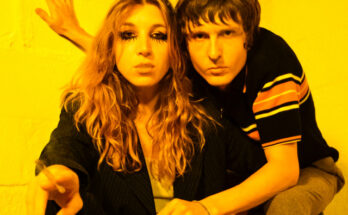What separates the Black Keys, an Akron, Ohio, blues duo from blues-rock revivalists on one hand, and myriad guitar/drums duos on the other? Though they’ve been embraced by Jack Black (their music appears in School of Rock) and other traditionalists, there’s nothing of the calculated virtuosity that ’80s hacks like SRV, or the slow, overly-precise revivalism of museum-piece bands. At the same time, they’ve shared best-of lists with futuristic, sure-bet artists like OutKast and been praised by forward-thinkers like the late-great DJ John Peel.
Maybe they can suit both camps because they’re just plain good. After hearing the possessed blues yelp of guitarist/vocalist Dan Auerbach, you’ll be as surprised to find out that he is a thin twenty-something white male in the same way you’d be surprised to find out your dad is dating Winona Ryder (conjugal visits, natch). Dressed in denim jacket and bedheaded, he’s an unlikely blues hero, but there is more than a pinch of Hendrix in Auerbach’s guitar-playing, which tends towards the grungy or the freaky. Drummer Patrick Carney is an extra-lanky and bespectacled youth himself; he regularly reprises the Hendrix Experience’s lauded percussionist Mitch Mitchell in both his fluid and energetic playing and his posture (a distinct slouch) while playing. Carney is, as it happens, the only support for Auerbach; in turn, the guitarist turns to thumbed bass notes, wide and bassy riffs, and daring technique.
This year saw the release of the third full-length for the duo, entitled Rubber Factory and, as the title suggests, recorded in an abandoned warehouse. There must have been some loose spirits or vibes, since it’s their most developed, loud and haunting work to date, with more funk and pop working it’s way into the rough-as-ever cracks and edges.
Critics and A&R folks, slow to accept the band, have been enthralled with the record. Reportedly scouted by Seymour Stein, president of Sire Records and known for his discovery of the Ramones and Madonna, the Keys instead chose to stay more independent, and signed to Fat Possum Records, home to both archaic blues anti-heros like recently deceased singer R.L Burnside and newer, blues-derived acts like Heartless Bastards and Thee Shams. This has provided the band with a unique opportunity to participate in the living history of their music. Their repertory itself mixes covers and originals, Rip Van Winkel tale of Richard Berry’s “Grown So Ugly,” which relates the story of a man who wakes up suddenly aged, and Western-influenced reading of the Kinks’ “Act Nice And Gentle,” on which Auerbach plays steel guitar and fiddle in addition to his electric guitar.
Honestly, though, the appeal of the Black Keys isn’t about the history or past of their music, nor is it about what their contemporaries have imposed upon them. As a result of their suburban upbring, their knowledge and experience of the blues is cosmopolitan and performance-oriented, but at the same time never divorced from the fury of rock music or the emotional appeal it can have. They are not blinded by technical expectations, though they are clearly up to the challenge of their rapid and driving style. The Keys are performers, merging their backgrounds into the greatest common multiple of their shared circumstances, embracing entertainment and history, showmanship and an honest concern for their music. As I’ve said before, the Black Keys make it safe to listen to the blues again.



